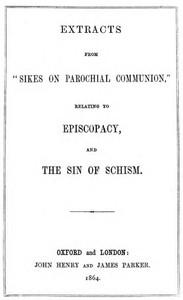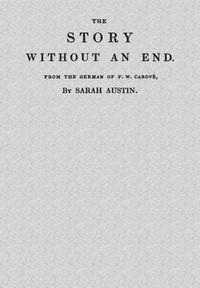Read this ebook for free! No credit card needed, absolutely nothing to pay.
Words: 30400 in 5 pages
This is an ebook sharing website. You can read the uploaded ebooks for free here. No credit cards needed, nothing to pay. If you want to own a digital copy of the ebook, or want to read offline with your favorite ebook-reader, then you can choose to buy and download the ebook.
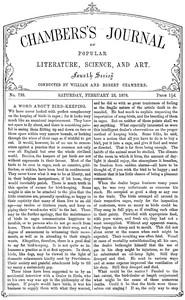

: Chambers's Journal of Popular Literature Science and Art No. 739 February 23 1878 by Various Chambers Robert Editor Chambers William Editor - Periodicals
CATHARINE MARIA SEDGWICK, 1789-1867 1
MARY LOVELL WARE, 1798-1849 43
LYDIA MARIA CHILD, 1802-1880 79
SARAH MARGARET FULLER OSSOLI, 1810-1850 165
HARRIET BEECHER STOWE, 1811-1896 209
LOUISA MAY ALCOTT, 1832-1888 251
CATHARINE MARIA SEDGWICK
During the first half of the nineteenth century, Miss Sedgwick would doubtless have been considered the queen of American letters, but, in the opinion of her friends, the beauty of her character surpassed the merit of her books. In 1871, Miss Mary E. Dewey, her life-long neighbor, edited a volume of Miss Sedgwick's letters, mostly to members of her family, in compliance with the desire of those who knew and loved her, "that some printed memorial should exist of a life so beautiful and delightful in itself, and so beneficent in its influence upon others." Truly a "life beautiful in itself and beneficent in its influence," the reader will say, as he lays down this tender volume.
Catharine Maria Sedgwick was born at Stockbridge, Mass., in 1789, the first year of the presidency of George Washington. She was a descendant from Robert Sedgwick, major-general under Cromwell, and governor of Jamaica. Her father, Theodore Sedgwick, was a country boy, born in 1746, upon a barren farm in one of the hill-towns of Connecticut. Here the family opened a country store, then added a tavern, and with the combined industries of farm, store and tavern, Theodore, most fortunate of the sons if not the favorite, was sent to Yale college, where he remained, until, in the last year of his course, he managed to get himself expelled. He began the study of theology, his daughter suggests, in a moment of contrition over expulsion from college, but soon turned to the law for which he had singular aptitude. He could not have gone far in his legal career when, before the age of twenty-one, he married a beautiful girl whose memory he always tenderly cherished, as well he might considering his part in the tragedy of her early death. He had taken small pox, had been duly quarantined and discharged but his young wife combed out the tangles of his matted hair, caught the disease, and died, within a year after marriage.
Marriage was necessary in those days, his daughter suggests, and the year of conventional widowhood having expired, Mr. Sedgwick, then at the age of twenty-three, married Miss Pamela Dwight, the mother of his four sons, all successful lawyers, and his three daughters, all exemplary women. The second Mrs. Sedgwick was presumably more beautiful than the first; certainly she was more celebrated. She is immortalized by her portrait in Griswold's "American Court," and by a few complimentary lines in Mrs. Ellet's "Queens of American Society."
Theodore Sedgwick rose to distinction by his energies and talents but, as we have seen, he was of sufficiently humble origin, which could not have been greatly redeemed by expulsion from college; while at the age of twenty-three, that must have been his chief exploit. Social lines were very firmly drawn in that old colonial society, before the plough of the Revolution went through it, and there was no more aristocratic family than the Dwights, in Western Massachusetts.
Madame Quincy gives an account of a visit, in her girlhood, paid to the mother of Miss Pamela, Madame Dwight, in her "mansion-house," and says that her husband, Brig.-Gen. Joseph Dwight, was "one of the leading men of Massachusetts in his day." Madame Dwight was presumably not inferior to her husband. She was daughter of Col. Williams, of Williamstown, who commanded a brigade in the old French War, and whose son founded Williams College. A daughter of Madame Dwight, older than Pamela, married Mark Hopkins, "a distinguished lawyer of his time," says Madame Quincy, and grandfather of Rev. Mark Hopkins, D.D., perhaps the most illustrious president of the college founded by Madame Dwight's family.
Free books android app tbrJar TBR JAR Read Free books online gutenberg
More posts by @FreeBooks

: Plain Parochial Sermons preached in the Parish Church of Bolton-le-Moors by Slade James - Sermons English 19th century; Episcopal Church Sermons
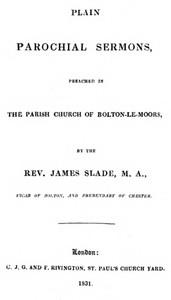

: Remarks upon the proposed destruction of the tower of the Parish Church of St. John Hampstead by Scott George Gilbert Sir - Church architecture England London; St. John's Parish Church (Hampstead London England)
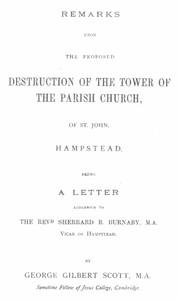

: Extracts from Sikes on Parochial Communion relating to Episcopacy and the sin of Schism by Sikes Thomas - Episcopacy Controversial literature; Schism
